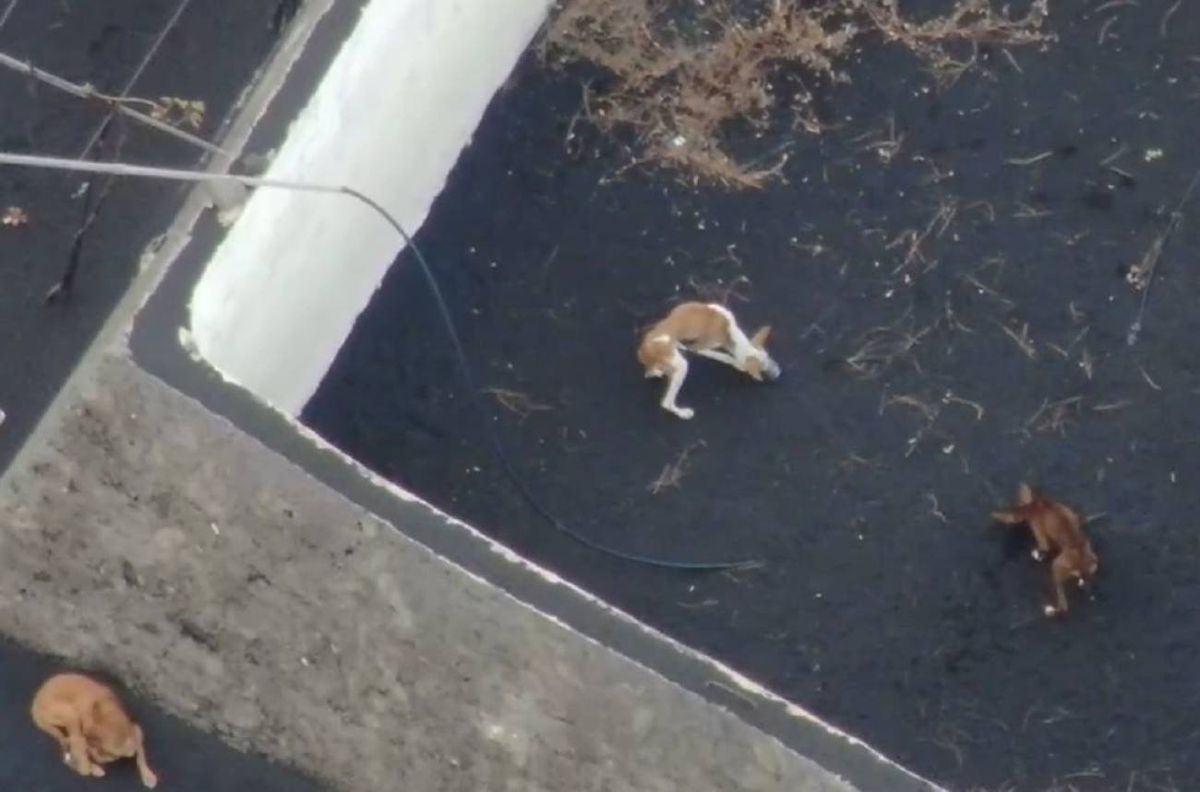A free way to rescue the four dogs (initially it was reported that there were three) who were trapped two weeks ago in two ponds in the exclusion zone of the La Palma volcano. The Steering Committee of the Canary Islands Volcanic Emergency Plan (Pivolca) has decided to allow animal rescue with drones once the official request for dog rescue has been received. Two local companies have been feeding the animals these days thanks to these tiny devices (less than 250 grams).
Aerocamara’s technicians and drone operators deployed Monday to prepare for the animal evacuation have already submitted their rescue strategy to representatives of the Cabildo, Military Emergency Unit (UME) and Forward Outpost, as explained before. The company in a press release. Once the plan has been formalized in writing and after final permission is obtained from the authorities, the Aerocamaras team will proceed to identify the land on which it will carry out an extraction, while awaiting the development of its analysis, which will be carried out in the next few days. The company moved its equipment thanks to the support of Iberia, which also covered the logistical costs.
We are ready to carry out the rescue operation. The lives of the dogs are at stake and our goal is to rescue them as soon as possible, it is imperative that we get them out of there soon and with permission in hand, we will start work now”, confirms Jaime Pereira, CEO of the company, in a press release. Pereira recently confirmed to EL PAÍS that what he will implement It constitutes an “unprecedented maneuver, which has not been undertaken in the world. But that is the case, or let them die,” explains Pereira. Over the past week, the executive says in a phone conversation with EL PAÍS, the company has adapted this process to a device it previously developed to transport goods to ships crossing the Strait of Gibraltar. This aircraft is two and a half meters long, is capable of carrying 24 kilograms of weight and is “very stable when carrying loads.” The company is already located in La Palma.
Aerocamara drones will begin delivering food and drink to the dogs, allowing operators to inspect the location where they will perform the extraction process while getting the animals used to the noise and presence of the device. This maneuver will be done with a 30x camera and a thermal one, according to the company. When the time comes to carry out the evacuation, the Galician operator will use a cargo drone equipped with its own logistics system adapted to the characteristics of the animals, along with another support aircraft.
There are other companies that are able to carry out this process, as evidenced by the Infodron.es portal. One of them, for example FlyingBasket, claims to be able to carry weights of up to 100 kilograms for 10 minutes or 23 kilograms for 35 minutes, although conditions in an area with lava can reduce this autonomy. FlyingBasket sources contacted by this newspaper confirmed their willingness to carry out the operation or any other freight transfer on the island, although they stressed that they needed assistance with logistics. Currently, there is a grassroots fundraising campaign being organized on GoFundme by Leales.org to pay off the veterinary debts of all associations on the island of La Palma and to help animals rescued after the volcano eruption. The initiative raised 13,000 euros.
The current legislation presents a legal void regarding the rescue of live animals using UAS (the acronym for Unmanned Aerial Vehicles in the sector, which responds to unmanned aircraft systemsUnmanned aerial systems), contrary to what was reported in previous news, which clarified that it is an illegal procedure.
In order to operate a drone, the operator must be registered with the State Aviation Safety Agency (AESA). There is something called EASA . activities, which are regulated by the European Union (EASA responds to the English acronym for the European Union Aviation Safety Agency), which are generally restricted to the flight of aircraft for purposes such as photographing, reviewing infrastructures or transporting goods.
There are other types of activities called No EASA, among them those developed by the military, customs, police, search and rescue, firefighting, border control, coastal surveillance or similar services, which are under the control and responsibility of a Member State. Rescue activities such as the four dogs fall into this category.
La Palma has been in a state of emergency since last October 5, so it is up to Pivolka to grant permission to fly.
You can follow EL PAÍS TECNOLOGÍA at Facebook social networking site And Twitter Or sign up here to receive semanal . newsletter.

Lifelong foodaholic. Professional twitter expert. Organizer. Award-winning internet geek. Coffee advocate.

